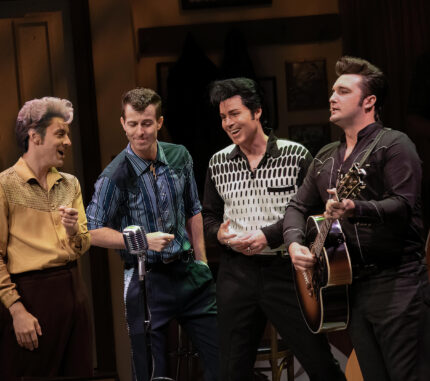
Jerry Lee, Carl, Elvis and Johnny croon together in Wick Theatre’s Million Dollar Quartet / Photo by Amy Pasquantonio
By Bill Hirschman
As the Wick Theatre’s electric production of Million Dollar Quartet powers through its audience standing and clapping through the last four numbers of the show, it’s easy to imagine that the sun never sets anywhere in the world where this musical isn’t playing every night.
This current visit of Elvis, Carl Perkins, Johnny Cash and Jerry Lee Lewis – possibly the seventh time on local stages – is just as rousing as you remember from its opening blast of “Blue Suede Shoes.”
It helps, of course, that most of the cast have played their roles or one of the other roles many times before: Cole (that’s the full name in the program) as Elvis, Matt McClure as Perkins, Bill Scott Sheets as Cash, and Lance Lipinsky who doubles as music director as well as Lewis. Truth is, even with wigs, makeup and costumes, all of them have just a vague physical resemblance to these icons, but their voices are close enough if not a religiously precise copy.
But director Zachariah Rosenbaum – one year out of college – invests it with slightly different emphases and inventive touches that make it seem relatively fresh.
For one thing, without changing the script, the plight of Sun Records’ founder Sam Phillips gets more attention for someone who virtually created then molded the nascent careers of these four, all of whom except Lewis have or are secretly leaving him.
Then, there is a segment normally in which Lewis antically makes fun of fervent religious people like Cash. Here, Rosenbaum lets Lipinski slow down the lampoon and milk it for everything its worth.
The set up by Floyd Mutrux and Colin Escott is loosely based on a real event on Dec. 4, 1956. Phillips had new protégé Lewis come in to back up a recording session with King of Rockabilly Perkins who had a monster hit with “Blue Suede Shoes” but was struggling to find a follow-up. Cash, whose contract with Phillips was about to expire, drops by with the plan to reveal he was moving on to Columbia Records. Elvis, already as mega-star with a movie under his belt, is in town and stops by because he is feeling a bit at sea with his new company RCA. He wants to get Phillips to agree to RCA’s offer to close Sun and hire Phillips to work with him.
There is a mixture of camaraderie, respect, jealousy, resentment and a half-dozen other emotions swirling around in conversations about business, biographical details, the past and – at this exact moment – what all five men see as an uncertain future. In fact, one of the things the show provides as a snapshot in time is a turning point as the country roots of rock is evolving into its own genre.
As interesting and well-executed as it all is, none of it is what you came for. And that’s what you get: 23 greatest hits with everybody backing each other up on instruments and harmonies. There’s classic rock ‘n roll like Lewis’ “Great Balls of Fire” and upbeat gospel like “Down By The Riverside.” Yes, “Folsom Prison Blues” and “Hound Dog” and “Sixteen Tons.”
As musicians, Lipinsky is amazing banging on the piano with classic Jerry Lee moves including the elbow slide down the keyboard; McClure nimbly creates a blur of fingers as lead guitarist.
Sheets has Cash’s bottom baritone voice, which he impressively slides into the basement notes. Cole doesn’t have the exact timber of Elvis’ voice, but he has the energy and lifeforce down to the requisite swaying hips and angled leg movements. McClure convincingly delivers the melancholy of Perkins trying to recapture the success of the previous year. Of course, Lipinsky has the showiest role and he take full advantage of Lewis’ braggadocio and physical exuberance down to lifting his microphone on a stand to mime a pool cue shot.
Even with their careers at various stages, they exude the knowledge of their own talent and skill; much of the evening is each trying overtly or subtly to outdo each other.
Adding significantly to the evening are Paul Louis as Phillips who genially narrates the evening as a memory, exhibiting Phillips’ pride with a touch of sadness. Then there’s Mallory Newbrough as Elvis’ girlfriend-of-the-moment who is always deep into the moment, physically swinging to the music. But she stops the show with a sultry rendition of “Fever” (a bit different than her lovely Cinderella a few months back and Janis Joplin about six years ago.)
And instrumental to the power and drive are St. Rose (another one-named artist) on the trap set and Aaron Krings on the upright bass.
As the fourth of four post-bow encores avers, there’s a “Whole Lotta Shakin’ Goin’ On.”
Note: Only five cellphones could be heard going off during the evening and one person filmed the four post-bow songs, although people had been warned to turn them off.
Million Dollar Quartet plays through May 21 at The Wick Theatre, 7901 North Federal Highway, Boca Raton. Performances 2 p.m. Wednesday, Thursday, Saturday, Sunday; 7:30 p.m., Thursday, Friday, Saturday. Runs 2 hours, 20 minutes including one long intermission. Tickets $79-$99. For tickets, visit www.thewick.org or 561-995-2333









 A PaperStreet Web Design
A PaperStreet Web Design
